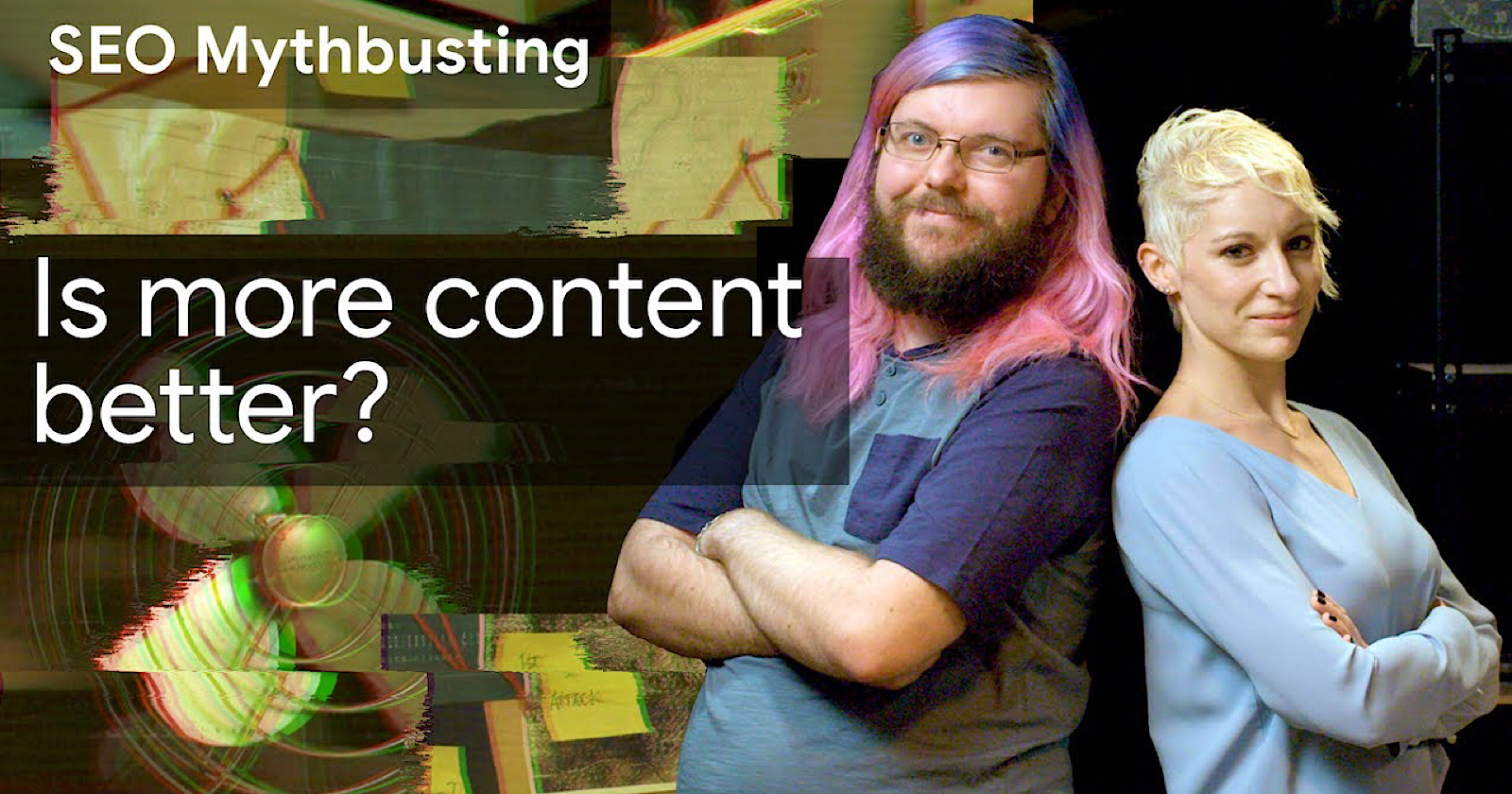Google’s Martin Splitt, and Lily Ray of Path Interactive, discuss the most common concerns SEOs have when it comes to creating website content.
Together they bust myths about more content being better, what to do about underperforming content, whether word count is a ranking factor, and more.
Here’s a quick recap of each question and answer, along with its corresponding time stamp in the video.
Content Creation Myths Busted
Updating the same type of content each year vs creating new one (00:00)
Ray asks: If a publisher routinely writes about the same topic every year, should they create new articles or update old ones?
If there’s only incremental changes to be made from one year to another, Splitt recommends updating existing articles.
Google may view similar articles from the same publisher as duplicate content, which is something you want to avoid.
How much content should I have and to what extent does this help my performance? (1:52)
Splitt advises not to produce content for the sake of producing content.
There’s only so much to be said about certain topics, in which case “rambling on” with article after article won’t help much.
Producing lots of content on a regular basis is most recommended for industry blogs where new information is coming out all the time.
Does having a blog / producing new content help my performance on Google? (03:02)
Frequently publishing new content is not a sitewide ranking factor, Splitt says.
However, showing that you frequently update your blog with things like industry news can enhance your reputation with visitors.
Updating older pieces of content (04:00)
Updating older content is worthwhile if something significant has changed.
If there are no significant changes, then Splitt recommends publishing new and different content, and linking the old article to the new one.
This has no impact on search performance, but it can be helpful to users.
Is there any way that Google tells us if there’s ‘too much content’ or maybe that content is underperforming? (04:40)
Ray asks whether Googlebot crawl statistics can be used to determine if a site has too much content.
How frequently Googlebot crawls your content is not a indication of content being good or bad, or having too much, Splitt says.
What would be more helpful is to check the performance report in Search Console.
If the report shows you’re getting a lot of impressions, but not many clicks, you might want to change something about it.
Splitt specifically states, “there’s no such thing as too much content.”
Again, it all comes back to your users and what they want to get out of visiting your site.
Underperforming content and the overall trustworthiness or authority (05:36)
Underperforming content will not necessarily bring down the authority of your site from Google’s perspective.
It all depends on why the content is underperforming.
For example, content may not be performing well because it’s spammy, which would reflect negatively on your site.
Regardless of the reason for content underperforming, it’s always a good idea to reassess whether it should be updated or taken down.
Grouping and consolidation of one’s content (06:19)
Ray asks about the impact of having substantial amounts of very short articles. Such as a single Q&A with only a few sentences.
Google may treat such pages as light/thin content, which would have a negative impact on search rankings.
Splitt recommends grouping the short pieces of content together into one big article, as long as it would make sense to do so.
Consolidating multiple pieces of relevant information in one place is something that reflects positively in Google Search
Is word count a ranking factor? (08:07)
No, word count is not a ranking factor.
If it takes 50 words, 100 words, or 1,000 words to communicate what a reader needs to know then it’s all fine in Google’s eyes.
What Google cares most about satisfying user intent.
If a user is searching for a question that warrants a quick answer then a shorter piece of content would be a good match.
There’s no point in extending the length of content to fit a certain word count.
Specific keywords and word count (8:39)
Rays asks whether publishers should aim for matching their competitors’ output when it comes to word count.
“It depends,” Splitt says.
If all your competitors are doing the same thing, it doesn’t necessarily mean they’re doing it right.
Even if your competitors are ranking well right now, it doesn’t mean they always will be.
Again, Splitt drives home the point of understanding what your users need and writing content accordingly.
If you can communicate what users need to know in 500 words versus 5,000 words, then a more succinct article is perfectly fine.
Auto-generated content & canonicalization (9:32)
Ray asks about the impact of having multiple location pages with virtually the same content on each.
“Either they work or they don’t,” Splitt says.
Those types of pages can work if there’s at least some unique information that’s relevant to each location.
The pages may not work if the content is too similar.
If you’re changing a handful of words, and keeping the rest of the content the same, then Google might de-duplicate the pages from its index.
How does Google determine duplicate content? (11:35)
Rays asks if Google has a threshold for identifying duplicate content.
Splitt is not sure if there’s a threshold. He explains that Google uses content fingerprinting to determine whether content is duplicated.
Each page has its own “fingerprint” that is used to determine how similar one piece of content is to another.
Splitt say Google uses “similarity metrics” as well, but did not provide any specifics.
See the full video below:





